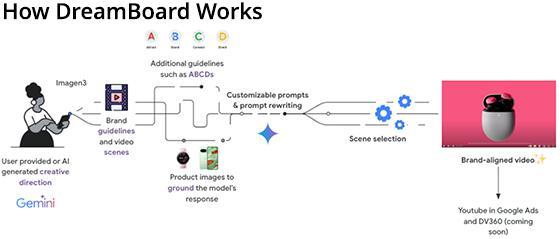
As the dynamics of advertising continually change,
Google has been experimenting with many versions to help brands create ads and quickly get them in front of consumers. Not all have made it into mainstream use.
One AI-powered platform,
DreamBoard, which has been floating around for months, has not seen much traction as a stand-alone strategy.
It generates high-quality video ads by combining AI capabilities with the brand's
guidelines and creative direction, using a combination of Gemini, Imagen, and Veo.
DreamBoard uses Gemini for ideas and brainstorming, Imagen for text-to-image generation, and Veo for
text-to-video. It also can use seed images, such as one photograph, for image-to-video generation. The files on GitHub can be found here.
advertisement
advertisement
Other features include inputting brand guidelines as well as using prompt rewriting and grounding techniques to refine
the model’s output with realistic visuals, according to the description.
The combination of the three AI products allows the creation of ad videos from concept to storyboard to video
generation.
Searches on Google and AI Mode did not return many results describing the tool. MediaPost reached out to Google for insights into the product. Google has yet to respond,
but a couple of agencies did.
Joe Warner, chief technology officer at Aimclear, told MediaPost that the marketing agency has no direct experience working with this code, but he did
confirm "it's real, and is a Google-published experimental codebase. Not a supported Google product.
"The current use appears limited," he said. "Likely used by a handful of agencies
and partners who cloned it and wired it to their Google Cloud Platform."
He said public traction is modest and he could not find any official case studies uploaded to GitHub,
Microsoft’s web-based platform that hosts and manage code for software development.
It is more of a custom software built on Google models such as Gemini, Imagen and Veo, not something
that someone can buy or get support for from Google Marketing Platform, Warner said.
NP Digital Vice President of Search Engine Optimization William Kammer called DreamBoard “a
prepackaged version of Agent HQ,” the platform announced this week by Microsoft GitHub for AI agents.
"We wouldn't send a prompt to Gemini. We could customize GPTs based on a
client's need," Kammer said. "Those deep in the weeds are already past this type of tool, but perhaps for a company just getting started, this content production agent team might be helpful."
DreamBoard contains a frontend that stitches together workflows, and the backend performs the AI functions like text, image, and video. It is accessed through API calls using FastAPI.
What makes it different, Google says, is that the separation of backends and frontends allows developers to create their own user interface or agents on the backend while still using
DreamBoard’s backend.